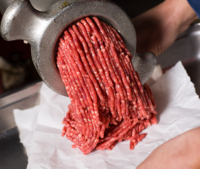According to a new report from the Office of the Inspector General (OIG), the U.S. Department of Agriculture’s Food Safety and Inspection Service (USDA FSIS) should re-evaluate its Escherichia coli testing for boxed beef destined for processed ground beef or tenderized-steaks.
The recommendation follows an OIG audit that found that inspectors are not often sampling boxed beef products destined for ground beef or tenderized steaks and that plants do not have adequate traceback records.
OIG’s team realized that there is a potential for downstream processors to grind untested boxed beef products, and they thus attempted to determine whether FSIS was accounting for these untested products. However, large slaughter facilities package cuts into vacuum-sealed bags and often assume that these products are intended for intact products and are thus not subject to FSIS’ E. coli testing. A downstream processor may decide to grind the meat or use the cuts for mechanically tenderized steaks, processing methods that can potentially introduce pathogens into the center of meat products that consumers might assume are intact.
OIG also noted that while the boxed beef is likely not tested for E. coli, it still bears the USDA mark of inspection, so establishments may assume that it is safe for grinding.
The report makes a number of recommendations for FSIS take additional steps to ensure any boxed beef headed for grinding is eligible for FSIS E. coli testing and FSIS agreed with all of the recommendations. One of the problems, however, as FSIS has noted, is that a plant’s decision to grind boxed beef is not something FSIS is likely to be aware of ahead of time. According to the report, FSIS is “near completion” on a non-intact beef risk assessment that could inform future food safety policies for mechanically tenderized products.
To view all of OIG’s findings and recommendations, see the full report at http://www.usda.gov/oig/webdocs/24601-0003-31.pdf.
Get our eMagazine delivered directly to your inbox
Stay in the know on the latest science-based solutions for food safety.
SUBSCRIBE TODAY!Copyright ©2024. All Rights Reserved BNP Media.
Design, CMS, Hosting & Web Development :: ePublishing


